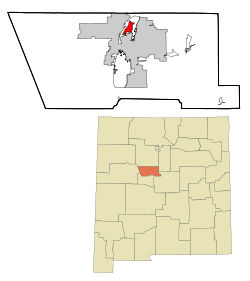Los Ranchos de Albuquerque, New Mexico
| Los Ranchos de Albuquerque, New Mexico | |
|---|---|
| Village | |

Village Hall
|
|
 Location of Los Ranchos de Albuquerque, New Mexico |
|
| Location in the United States | |
| Coordinates: 35°9′42″N 106°38′47″W / 35.16167°N 106.64639°WCoordinates: 35°9′42″N 106°38′47″W / 35.16167°N 106.64639°W | |
| Country | United States |
| State | New Mexico |
| County | Bernalillo |
| Area | |
| • Total | 4.4 sq mi (11.3 km2) |
| • Land | 4.4 sq mi (11.3 km2) |
| • Water | 0.0 sq mi (0.0 km2) |
| Elevation | 4,987 ft (1,520 m) |
| Population (2010) | |
| • Total | 6,024 |
| • Density | 1,386/sq mi (535.0/km2) |
| Time zone | Mountain (MST) (UTC-7) |
| • Summer (DST) | MDT (UTC-6) |
| ZIP codes | 87107, 87114 |
| Area code(s) | 505 |
| FIPS code | 35-43930 |
| GNIS feature ID | 0918239 |
| Website | losranchosnm |
Los Ranchos de Albuquerque, known locally simply as "Los Ranchos" or "The Village," is a village in Bernalillo County, New Mexico, United States. The population was 6,024 at the 2010 Census. Part of the Albuquerque Metropolitan Statistical Area, Los Ranchos is located on the east side of the Rio Grande, adjacent to the unincorporated North Valley area. Los Ranchos is surrounded on three sides by the larger city of Albuquerque, and its location astride busy transportation routes has been a source of friction with its larger neighbor, as Los Ranchos' efforts to maintain its rural character conflicts with Albuquerque's desire to enhance transportation. Like the North Valley and Corrales, Los Ranchos is an expensive, mostly rural area with widely spaced large houses and dense vegetation.
Signs of human activity in this area date back to as early as 10,000 B.C. The introduction of cultivated maize from Mexico in 1,000 B.C. marked a major turning point in the settlement of the region, causing the traditionally nomadic tribes of the area to adopt a more agricultural way of life. The first pueblos in the area appeared between 1 and 600 A.D., established by the Tiwas (called Tigua by the Spaniards), and by 1,200 AD there were already 14 major sites along the Rio Grande from Algodones to Isleta, the Chamisal Site in present-day Los Ranchos being among the largest of these communities.
Hernando de Alvarado was reported as being one of the first Europeans to lay eyes on the middle Rio Grande Valley in September 1540 as the leader of a small convoy sent out by Coronado. He described the area as a "broad valley planted with fields of maize and dotted with cottonwood groves. There are twelve pueblos, whose houses are built of mud and are two stories high." The first colonizing expedition into New Mexico was led by Juan de Oñate in 1598, who left the Tiwan province under the spiritual care of Fray Juan Claros.
...
Wikipedia

